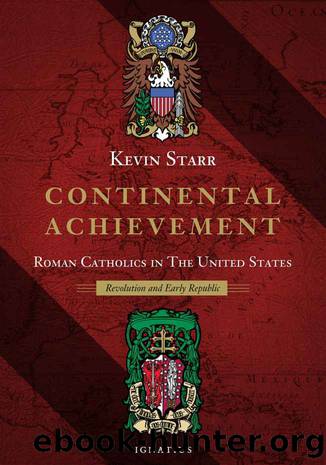Continental Achievement by Starr Kevin;

Author:Starr, Kevin; [Starr, Kevin]
Language: eng
Format: epub
Tags: Spiritual & Religion
ISBN: 9781642291353
Publisher: Ignatius Press
Published: 2020-08-31T00:00:00+00:00
A troublesome debate
One ex-Jesuit, two secular priests, and an Irish Capuchin caused Carroll grave concern during his time as prefect. Born in Maryland in 1748, Charles Wharton experienced a cursus honorum typical of Maryland-born Jesuits: Saint Omerâs, the novitiate at Watten, and philosophical and theological studies at Bruges and Liège, where he was posted as professor of mathematics following ordination in 1772 and tertianship (a further nine months of spiritual training). When the Society was suppressed in 1773, Whartonâlike a number of other Maryland-born Jesuitsâfed to England, where he remained on mission for nine years. By the early 1780s, however, Wharton was having a crisis of doubt regarding Roman Catholicism in general and his membership in the Society of Jesus in particular. By the summer of 1782 he was defending the validity of his doubts in a treatise anchored in Scripture, patristics, and Church history and aimed at such recurring points of argument in polemics of this kind as transubstantiation, papal authority, denial of salvation outside the Catholic Church, and mandatory celibacy for clergy and religious. Whartonâs treatise evenhandedly avoided the usual pyrotechnics of polemical games in favor of a tone of meditation, scholarship, memoir, and regretful leave-taking. The ordeal of composing the treatise and upending a lifetime of beliefs and allegiance brought Wharton to the edge of nervous and physical collapse. Resigning his chaplaincy in England, he returned to Maryland in June 1783 and lived quietly with his brother on the family plantation about sixty miles from Carrollâs home at Rock Creek. Wharton had no faculties at the time (Bishop James Talbot of the London District was refusing to grant faculties to Americans now that the United States had become an independent nation), and Wharton made no effort to practice as a priest. As Carroll informed Charles Plowden in a letter dated 26 September 1783, he had visited Wharton once and enjoyed his company. Carrollâs slightly defensive remarks underscored that rumors of theological instability had grown up around Wharton in England and had followed him to the United States.
Imagine, then, Carrollâs disappointment when Wharton left the Church and announced his decision in a pamphlet titled Letter to the Roman Catholics of the City of Worcester, which was published in Philadelphia in June 1784. The Letter was well received in Protestant circles, and Wharton became a minister of the Episcopal Church. Carroll was stung by the pamphlet. He thought that pamphlet wars were a thing of the past. Certainly no Catholic pamphlets of this type had appeared of late. Far from it: the Catholic clergy of the United States had done everything in its power to avoid such public polemics against Protestantism, the Christianity of preference for a believing American nation. But to have pamphlet wars revived by a former Jesuit, a Marylanderâhow embarrassing!
Still, Carroll decided, Whartonâs Letter had to be answered, but not with an attack on the Protestant community that would reignite the old animosities. Carroll would write his rebuttal as the pastorally oriented An Address to the
Download
This site does not store any files on its server. We only index and link to content provided by other sites. Please contact the content providers to delete copyright contents if any and email us, we'll remove relevant links or contents immediately.
| Americas | African Americans |
| Civil War | Colonial Period |
| Immigrants | Revolution & Founding |
| State & Local |
In Cold Blood by Truman Capote(2709)
Steve Jobs by Walter Isaacson(2466)
All the President's Men by Carl Bernstein & Bob Woodward(1978)
Lonely Planet New York City by Lonely Planet(1863)
The Murder of Marilyn Monroe by Jay Margolis(1757)
The Room Where It Happened by John Bolton;(1735)
The Poisoner's Handbook by Deborah Blum(1683)
And the Band Played On by Randy Shilts(1640)
Lincoln by David Herbert Donald(1627)
The Innovators by Walter Isaacson(1618)
A Colony in a Nation by Chris Hayes(1540)
The Innovators: How a Group of Hackers, Geniuses, and Geeks Created the Digital Revolution by Walter Isaacson(1526)
Under the Banner of Heaven: A Story of Violent Faith by Jon Krakauer(1431)
The Unsettlers by Mark Sundeen(1353)
Amelia Earhart by Doris L. Rich(1352)
Birdmen by Lawrence Goldstone(1352)
Decision Points by George W. Bush(1268)
Dirt by Bill Buford(1258)
Zeitoun by Dave Eggers(1239)
